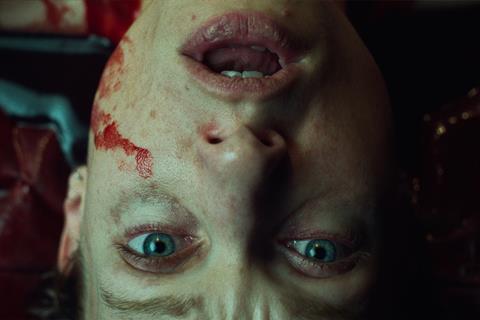Julia Franz Richter takes centre stage in this conventional, if atmospheric, horror

Dir: Andreas Prochaska. Austria/Germany. 2025. 115mins
Following the death of her estranged father, a successful Berlin paramedic inherits the sprawling family home in the Austrian countryside — a place that she barely remembers but that still houses the ghosts of a painful, repressed past. The latest work from Austrian writer/director Andreas Prochaska leans heavily into psychological thriller tropes, but delivers a hypnotic atmosphere and a gripping central performance from Julia Franz Richter.
The film’s potent aesthetics do the narrative heavy lifting
This marks Prochaska’s returns to the big screen after a decade working in television. His last film was 2014 Austrian Western The Dark Valley, which also premiered in Berlin and went on to win local awards before releasing in Austria and Germany. Welcome Home Baby, which opens this year’s Panorama, could follow a similar trajectory, although decent word of mouth, particularly amongst genre fans, may help find streaming audiences further afield. It makes the same great use of its isolated forest locale as did fellow Austrian/German horror The Devil’s Bath, which premiered in Berlin 2024.
Like The Dark Valley, this confidently layers a well-defined cinematic template onto an almost-idiosyncratically bucolic rural Austrian setting; last time, it was the Western, this time it’s horror — more specifically, the overwrought, cult-tinged American horrors of the 1960s and 1970s. Foremost in this film’s influences is Rosemary’s Baby, not least because Richter (who also appears in Mother’s Baby, another Berlin title concerned with the ravages of motherhood) looks rather like that film’s lead Mia Farrow.
When we first meet Judith, however, she’s a no-nonsense Berlin paramedic, holding her own against a demanding boss and various medical emergencies. (A graphic early birth scene sets the tone for the film’s fascination with fecundity and physical metamorphosis.) When she discovers she has inherited her father’s old home, Judith and her husband Ryan (Dutch actor Reinout Scholten van Aschat) travel to Austria in order to sell the place. It’s soon clear, however, that the community — and perhaps even the house itself — have other ideas.
The action unfolds in an unnamed village in the forested region of Lower Austria, which is so festooned with red flags that it’s a wonder Judith and Ryan even get out of the car. An ominous cross looms over the road into town. Deer carcasses are a recurring motif. The house itself is stuffed with standard genre paraphernalia; photos with scratched out faces, huge rusty keys, paintings of devils and skeletons. But the place immediately exerts a strong hold on Judith, who is desperate to know why she was abandoned by her parents as a young child. A scar on her chest is just one of the clues of the trauma she may have been through.
Judith also wants to know why she is so welcomed by a community, largely made up of smiling, self-assured women and headed by the chillingly benign ‘Aunt’ Paula (Gerti Drassl), who have not seen her for decades, and yet slowly ingratiate themselves into Judith’s life — and head. It’s not long before the clearly defined lines of Judith’s ordered life in Berlin erode and she finds herself losing control, suffering bizarre dreams and jumps in time, temporal shifts that are effectively handled by editor Karin Hartusch (who also serves up some impressive jump scares). Ryan seems to be changing too, their close relationship wrenched apart just at a time when Judith needs him the most.
This conclave of toxic femininity seems to be rooted in antiquated cultural tradition, and ideas of motherhood, sacrifice and generational duty churn beneath the surface as Judith — childfree by choice — attempts to hold firm against what is expected of her. While cinematographer Carmen Triechl perhaps relies too much on off-kilter angles, Judith’s growing isolation is effectively emphasised by framing which often places her alone in a single pool of light surrounded by intense darkness — and, sometimes, thick silence. The film’s colour palette paints entire key scenes in vibrant shades of red, yellow or cool tonal blues that are replicated in the photographs Ryan develops in the basement dark room, the past slowly coming into focus.
For the most part, the film’s potent aesthetics do the narrative heavy lifting, meaning that both the screenplay, by Prochaska, Daniela Baumgartl and Constantin Lieb, and performances remain controlled – and questions, particularly about the community’s shadowy motivations, largely unanswered. The gloves come off, however, in the film’s climactic scenes, in which the restrained tension bubbles over in a no-holds-barred showdown, which may be a step too far for some viewers, or an entertaining slice of camp excess for others.
Production companies: Lotus Film Production, Senator Film Production
International sales: Global Screen, info@globalscreen.de
Producers: Tommy Pridnig, Clemens Wollein, Ulf Israel, Reik Moller
Screenplay: Andreas Prochaska, Daniela Baumgartl, Constantin Lieb
Cinematography: Carmen Triechl
Production design: Claus Rudolf Amler
Editing: Karin Hartusch
Music: Karwan Marouf
Main cast: Julia Franz Richter, Reinout Scholten van Aschat, Gerti Grassl, Maria Hofstadter, Gerhard Liebmann, Erika Mottl
























